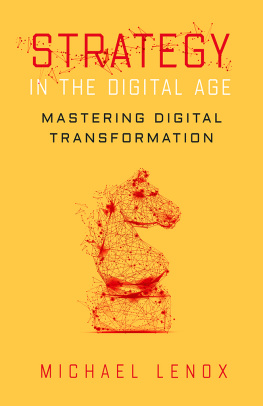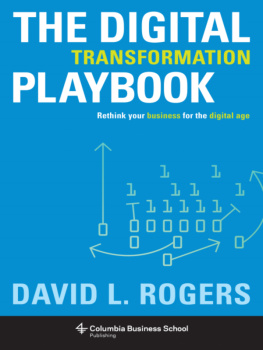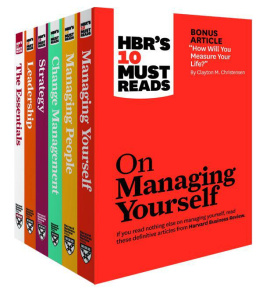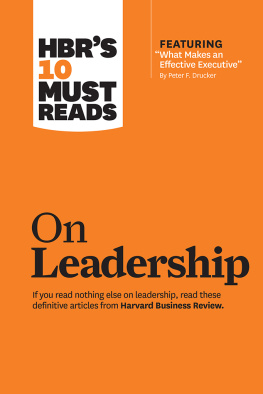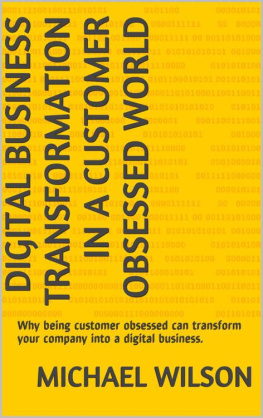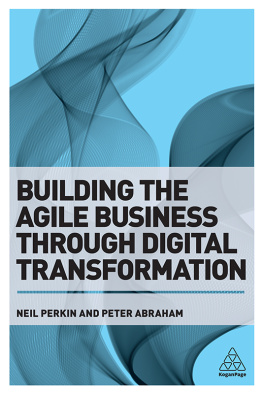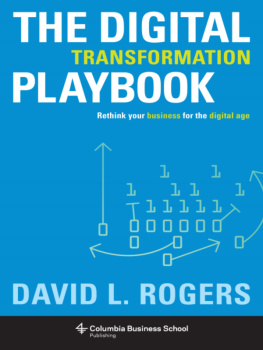Contents
Guide
HBRs 10 Must Reads series is the definitive collection of ideas and best practices for aspiring and experienced leaders alike. These books offer essential reading selected from the pages of Harvard Business Review on topics critical to the success of every manager.
Titles include:
HBRs 10 Must Reads 2015
HBRs 10 Must Reads 2016
HBRs 10 Must Reads 2017
HBRs 10 Must Reads 2018
HBRs 10 Must Reads 2019
HBRs 10 Must Reads 2020
HBRs 10 Must Reads 2021
HBRs 10 Must Reads for CEOs
HBRs 10 Must Reads for New Managers
HBRs 10 Must Reads on AI, Analytics, and the New Machine Age
HBRs 10 Must Reads on Boards
HBRs 10 Must Reads on Building a Great Culture
HBRs 10 Must Reads on Business Model Innovation
HBRs 10 Must Reads on Career Resilience
HBRs 10 Must Reads on Change Management (Volumes )
HBRs 10 Must Reads on Collaboration
HBRs 10 Must Reads on Communication (Volumes )
HBRs 10 Must Reads on Creativity
HBRs 10 Must Reads on Design Thinking
HBRs 10 Must Reads on Diversity
HBRs 10 Must Reads on Emotional Intelligence
HBRs 10 Must Reads on Entrepreneurship and Startups
HBRs 10 Must Reads on Innovation
HBRs 10 Must Reads on Leadership (Volumes )
HBRs 10 Must Reads on Leadership for Healthcare
HBRs 10 Must Reads on Leadership Lessons from Sports
HBRs 10 Must Reads on Lifelong Learning
HBRs 10 Must Reads on Making Smart Decisions
HBRs 10 Must Reads on Managing Across Cultures
HBRs 10 Must Reads on Managing in a Downturn, Expanded Edition
HBRs 10 Must Reads on Managing People (Volumes )
HBRs 10 Must Reads on Managing Risk
HBRs 10 Must Reads on Managing Yourself (Volumes )
HBRs 10 Must Reads on Mental Toughness
HBRs 10 Must Reads on Negotiation
HBRs 10 Must Reads on Nonprofits and the Social Sectors
HBRs 10 Must Reads on Organizational Resilience
HBRs 10 Must Reads on Platforms and Ecosystems
HBRs 10 Must Reads on Public Speaking and Presenting
HBRs 10 Must Reads on Reinventing HR
HBRs 10 Must Reads on Sales
HBRs 10 Must Reads on Strategic Marketing
HBRs 10 Must Reads on Strategy (Volumes )
HBRs 10 Must Reads on Strategy for Healthcare
HBRs 10 Must Reads on Teams
HBRs 10 Must Reads on Women and Leadership
HBRs 10 Must Reads: The Essentials
Copyright
HBR Press Quantity Sales Discounts
Harvard Business Review Press titles are available at significant quantity discounts when purchased in bulk for client gifts, sales promotions, and premiums. Special editions, including books with corporate logos, customized covers, and letters from the company or CEO printed in the front matter, as well as excerpts of existing books, can also be created in large quantities for special needs.
For details and discount information for both print and ebook formats, contact .
Copyright 2021 Harvard Business School Publishing Corporation
All rights reserved
No part of this publication may be reproduced, stored in or introduced into a retrieval system, or transmitted, in any form, or by any means (electronic, mechanical, photocopying, recording, or otherwise), without the prior permission of the publisher. Requests for permission should be directed to , or mailed to Permissions, Harvard Business School Publishing, 60 Harvard Way, Boston, Massachusetts 02163.
First eBook Edition: Sep 2021
ISBN: 978-1-64782-216-3
eISBN: 978-1-64782-217-0
Discovery-Driven Digital Transformation
by Rita McGrath and Ryan McManus
WHATS YOUR DIGITAL STRATEGY? That simple question often throws the CEOs of traditional companies into a panic. They believe that digital technologies and business models pose an existential threat to their way of doing businessand of course theyre right. But the pressure they feel often leads them to make big bet-the-farm movesand thats usually wrong.
Veon, a large multinational provider of telecommunications services, is a case in point. Its new digital platform, introduced in 2017, was a huge project, involving 100 staff members in Amsterdam and another hundred or so in its London office. The idea was to create a mobile app that would offer users rich localized experiences and serve as a sales channel for Veons commercial partners (such as Mastercard). Management considered the project its top priority. But after being launched with much fanfare, the app got a lukewarm response from customers, and the effort to build a new ecosystem around it was scrapped. The failure led to a management exodus, layoffs, and a back-to-basics strategy with digital efforts sidelined to pilot-project stage.
Veon still needs a new business model, though, and clearly cant afford to make many more large investments in searching for one.
It doesnt have to. Just because a threat is huge doesnt mean that a response has to be. To the contrary, companies like Veon would actually be much better off taking a more incremental approach to transformation over time. While they should always have a vision of where they want to go, they should work their way toward it by continually finding opportunities to digitize problematic processes in their core operations. When they tackle those projects, theyll learn what metrics to use, which assumptions to revise, where they can introduce new business models, and who their new competitors might be. And as they absorb those lessons, their understanding of their competitive landscapeand the long-term goals they set for themselveswill inevitably change.
Theres already a process for this kind of ongoing learning approach to strategy: discovery-driven planning (DDP). One of us, Rita, and Ian MacMillan developed it in the 1990s as a product innovation methodology, and it was later incorporated into the popular lean start-up tool kit for launching businesses in an environment of high uncertainty. At its center is a low-cost process for quickly testing assumptions about what works, obtaining new information, and minimizing risks.
In the following pages well describe how an adapted form of DDP can help incumbent firms confront digital challenges and learn their way toward a new business model. Lets begin by looking in more detail at why a step-by-step transformation works better for traditional firms than the all-or-nothing approach that characterizes a start-ups pivot.
The Incremental Advantage of Incumbent Firms
Economists have long puzzled over why firms exist at all and, at a more granular level, which tasks belong within the boundaries of a given firm. One line of thought, begun by Ronald Coase in the 1930s, suggests that under certain conditions, market transactions often are not satisfactory for individuals: when it is difficult or expensive to get information about what you want to buy, when bargains are hard to strike because information is asymmetrical, and when its costly or challenging to enforce agreements. If any of those conditions apply, it makes sense to keep the activities involved within a firm.
Idea in Brief
The Problem
Established companies spend billions trying to turn themselves into digitized orchestrators of some new ecosystem, only to fall flat on their faces.
Why It Happens
The CEOs believe that the existential threat posed by digital disrupters requires a gigantic, model-busting response.
The Solution
Adopt an incremental experimental approach: discovery-driven digital transformation. Look for problems to fix with digital technology, but exploit your rich knowledge of customers, broad operational scope, and deep talent pools while learning your way to a new business model.


